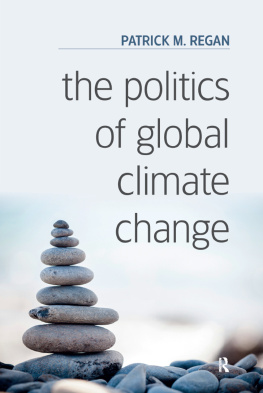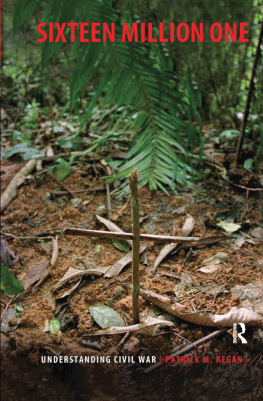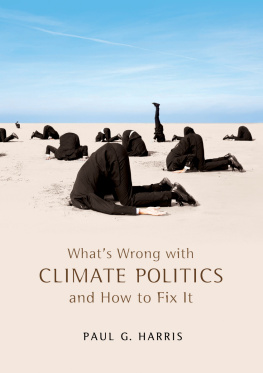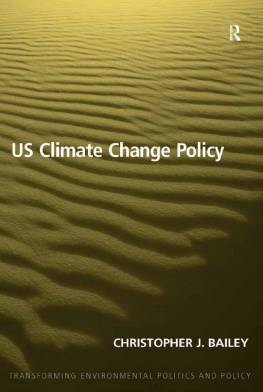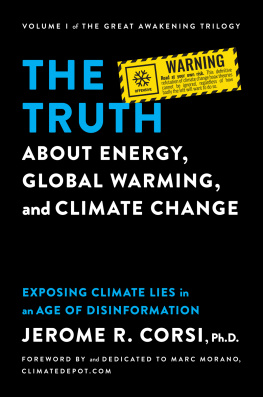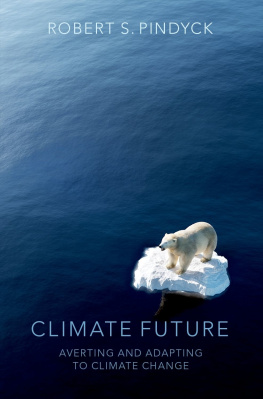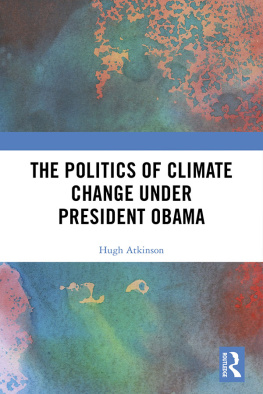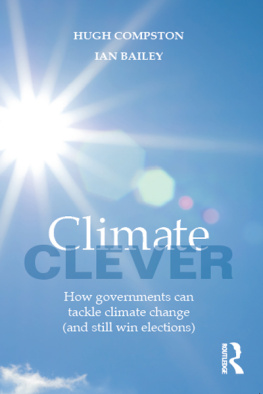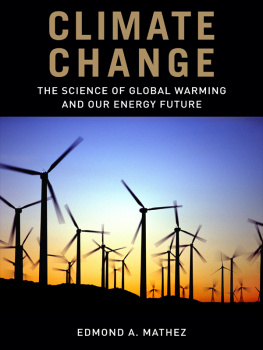First published 2015 by Paradigm Publishers
Published 2016 by Routledge
2 Park Square, Milton Park, Abingdon, Oxon OX14 4RN
711 Third Avenue, New York, NY 10017, USA
Routledge is an imprint of the Taylor & Francis Group, an informa business
Copyright 2015, Taylor & Francis.
All rights reserved. No part of this book may be reprinted or reproduced or utilised in any form or by any electronic, mechanical, or other means, now known or hereafter invented, including photocopying and recording, or in any information storage or retrieval system, without permission in writing from the publishers.
Notice:
Product or corporate names may be trademarks or registered trademarks, and are used only for identification and explanation without intent to infringe.
Library of Congress Cataloging-in-Publication Data
Regan, Patrick M., author.
The politics of global climate change / Patrick M. Regan.
pages cm
Includes bibliographical references and index.
ISBN 978-1-61205-789-7 (pbk. : alk. paper) ISBN 978-1-31563-272-8 (eBook)
1. Climatic changesPolitical aspectsUnited States. 2. Greenhouse gas mitigationInternational cooperation. 3. Conflict of interests. I. Title.
QC903.2.U6R44 2014
363.738'74dc23
2014026407
Designed and typeset by Straight Creek Bookmakers.
ISBN 13: 978-1-61205-789-7 (pbk)
ISBN 13: 978-1-61205-788-0 (hbk)
The idea of writing this book came while I was developing a course that would include a five-week section on climate change. In trying to develop the outlines for the course, I came across the Clean Energy and Security Act of 2009 and the failed Copenhagen summit later that year. It seemed odd to me that a House of Representatives with a 75-vote Democratic majority only barely passed an environmental bill supported by the newly elected president, and then the president, who went to Copenhagen with permission from the House to come home with a climate change treaty, returned without one. The failure at Copenhagen required an explanation. Most of those explanations I could find involved either descriptions of the institutional arrangements for negotiating and enforcing treaties or some description of the dynamics of the bargaining process that pitted China and other large polluters against the United States in the summit negotiations. The vote in the House, however, suggested that the explanation might be found closer to home, in U.S. policy and those who make it.
Given the campaign theme of Obamas 2008 election (Change), and the overwhelming Democratic majority elected to Congress, the close vote on HR 2454 was telling us that underlying interests of individual congressional representatives, rather than a global good, were driving their votes. I assumed that cutting CO2 emissions to stabilize our climate was conventional wisdom, and because of this, I had expected an easy pass on HR 2454. The puzzle of HR 2454 along with the failed Copenhagen summit became the organizing theme of the climate section in my initial class. By the end of the class, I had a research project in the making, and to complete it, I had to learn about climate and atmospheric science, hydrology, ecology, and biology, and I had to think more closely about the relationship between American politics and world politics. As a scholar of conflict, I had expected much of my attention to be devoted to links between climate change and conflict. That didnt happen.
Part of this project involved asking myself if wed ever faced another problem comparable to climate change. Collective action problems are ubiquitous and quite varied, but I couldnt come up with one that posed the kind of challenge this one does. I was talking with a chemist friend about how the quantities of CO2 are greater than those of the carbon product that was consumed, and how carbon consumption pervades everything we do. He reminded me that we dont create carbon or oxygen atoms; we just move them around. And when we combine them in certain ways, we create a molecule, CO2, that has nearly four times the mass of a carbon atom alone. Because oxygen and carbon are so instrumental to our lives, ridding ourselves of the problem of excessively high concentrations of CO2 will require changes in the way we undertake this mixing process. We cant avoid it, but we could do it more efficiently. I couldnt come up with another natural or anthropogenic process that could rival this one, either in the difficulty of resolving its consequences or in the normalness of the process of creating it.
Having thought through this issue from many angles, I came to the realization that the climate change problem that results from our overproduction of CO2 molecules is primarily a political problem. Climate scientists can tell us about the effect of increasing concentrations of CO2 in the atmosphere and the processes by which this takes place; hydrologists can tell us about the effect of drought or rainfall on soil moisture and crop yields; biologists can inform us about the deleterious consequences of changing migratory patterns in response to changing weather patterns. No one can tell us how to implement fixes, because those fixes require political decisions and commitment.
If politics are the key to solving the climate change problem, there had to be a way to think about how politics sits at the core of the collective action problem. We recognize that the individual is unlikely to take concerted action absent altruism. So the traditional collective action problem has to be approached differently; politics has to be front and center in our thinking about when and why we act (or dont). Moreover, it became clear that this isnt simply a problem for individuals or international treaties, but one that requires involvement at three levels. As individuals, we will act out of self-interest, altruism, or coercion. But our elected officials display self-interested behavior tied to electoral cycles, and talk of jobs plays better to constituencies than any altruistic call to save the planet. It is also clear that Congress has to affect our individual behaviors, either through coercion or enticements, and until it gets on board, each individual has little incentive to act in ways that reduce impact on the climate. Even the informed and committed will drive a less efficient car than is available or live in a bigger house than is necessary. Consumption patterns are so pervasive that just understanding the issue is not enough to substantially alter behaviors. And international treaties will be necessary to generate compliance and commitment at the national level. This is what the meetings in Paris, Durbin, Copenhagen, and Kyoto are all about.
My foray into the world of climate change politics made me look at my own small corner of the world from the perspective of waste. If we have to cut our consumption without changing our lifestylesthe easiest way to maximize on personal preference and climate stabilityeliminating waste and increasing efficiency will be critical to the solution. Most of us today, I suspect, dont think about waste. Waste comes in the form of overconsumptioninefficiency or methods that privilege convenience over health or necessityand from careless use of energylights left on, DVRs that cant shut down, and heat too high. There is also a considerable amount of waste of electricity in the transmission from power plants to houses. The government estimates that up to 40 percent of electricity generated for consumption is wasted in the transmission process (EIA 2014). Even though eliminating or reducing waste will not be enough to mitigate our impact on the climate, it will have to be a significant part of the easy steps along that route.

